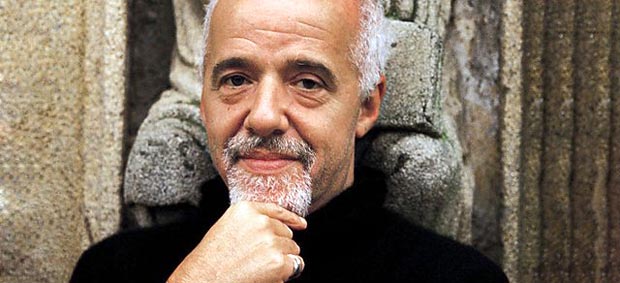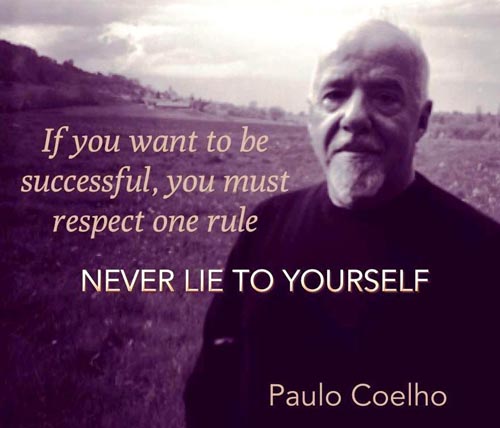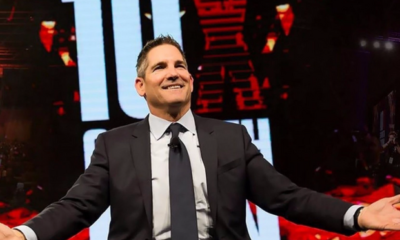Life
4 Things I Learned About Life From Paulo Coelho
I haven’t read The Alchemist.
Yeah, I know. For someone who writes an article about Paulo Coelho AT LEAST I should read the book that made him a success.
But the only book I read was Aleph and it was really good. After reading it, I had an image of him as a very spiritual and calm person.
To learn more about Paulo Coelho, I read his authorized biography, “The Warrior’s Life,” which was written by Fernando Morais.
The most interesting parts of the book were the stories of his youth, which were far from what I had imagined. They were inspiring and made me reflect upon my life.
Read further to know the four life lessons you can learn from Paulo Coelho’s youth. Trust me – it’s worth it.
1. If you have a weakness, learn to compensate for it with your strength.
Paulo was weak physically.
According to his biography he was “very thin, frail and short.” He had a nickname – Pele – which means ‘skin. It was given only to those who were always being bullied by their classmates.
Considering his physical weakness, it was hard for Paulo to gain the respect of his peers. Yet he found out that despite his weakness, he managed to gain their respect.
How?
I quote: “By knowing things no one else knew and reading stories none of his peers had read was one way of gaining respect.”
The lesson: If you think you have a weakness, you don’t necessary need to remove that weakness. Some weaknesses, especially physical ones, are hard to get rid of. A more effective way would be to find your strengths and work on them until you are at least above average.
Or better yet: Be so good they can’t ignore you.
2. Rejection doesn’t matter. What matters is what you do after being rejected.
Paulo believed in himself. He believed that he was a good poet and that his poems were not suitable for small magazines. So he sent his poems to the ‘Escritores e Livros,’ a reputable literary column in a newspaper called Correio da Manha.
After a week, Paulo looked at the newspaper and read the following:
“To all young show-offs who are desperate to get themselves a name and publish books, it would be worthwhile recalling the example of Carlos Drummond de Andrade, who only published three volumes totalling 144 poems in 15 years.”
Like any normal person, he took it personally, but managed to regain his confidence and write his own version of Rudyard Kipling’s famous poem “If…”.
If you ask your friends and enemies for a chance.
If you can hear a ‘no’ and take it as a ‘maybe,’
If you can start from the bottom and yet still value the little that you have.
If you can improve yourself each moment and reach heights without succumbing to vanity.
Then you’ll be a writer.
The lesson: Rejection always hurts. Some say that rejection shouldn’t be taken personally, but honestly, I don’t think that advice helps. We value ourselves and the things we create, thus rejection brings a cognitive dissonance inside our minds.
Two conflicting thoughts, self-belief and self-doubt, wage wars to determine who will stay and rule the kingdoms inside our heads.
When there are two conflicting thoughts, we need something to guide us on what to do after the rejection. If you don’t know what to do or what to believe in, most of the time the evil side will win the war.
In the case of Paulo, his self-belief won and this is because of a certain obsession of his.

3. Be obsessed with your dream
Paulo was obsessed with the idea of becoming a famous writer. Yet, it was funny that the obsession only bore fruit in his later years.
This is because he was always changing his art: from poetry to acting, directing, writing about the occult, and lyric writing.
Although he gained success in some of his ventures, he kept reminding himself that he wanted to be a famous writer. That obsession made him what he is today.
The lesson: Sometimes, we think our dream lies buried under a pile of work or studies. I’m the same. I am going to a medical school, but I know being a doctor is not my dream. I want to be an entrepreneur.
For several reasons, I can’t cancel my entry to medical school. It looks like I don’t have a choice, but I actually have one: to choose to stick with my dream no matter what or to succumb to the path people ‘forced’ me to go on.
The same thing goes for you. Be obsessed with your dream and don’t let it die easily.
4. Your ‘horrible’ past doesn’t make you a failure in the future
One word sprung up inside my mind when I read about Paulo’s past – horrible.
Paulo failed in his studies, almost killed a boy because of his driving, was forced to stay in a psychiatry clinic because of his escalating problems, took drugs, was kidnapped by a secret organization and embraced Satanism.
There was more, but you get the picture.
Looking at his past, I was amused by the stark difference between his past and future selves. It shows how someone’s past is not a good predictor of his future because he is capable of changing it if he is willing.
The lesson: The problem with most of us is we focus on things we can’t change. It is true that our past can influence our future, but we don’t want to let that influence spread too much and work of its own accord.
We should stop doing that: Stop letting the past be our fortune-teller. What we need to do is to focus on the present and take control of our future.
Why?
We are the fortune-teller.
Conclusion
Let me leave you with a quote from the man, Paulo Coelho, himself:
“At a certain point in our lives, we lose control of what’s happening to us, and our lives become controlled by fate. That’s the world’s greatest lie.”
Thanks for reading.

Question: What have you learned from reading Paulo Coelho’s books?
If you haven’t read The Alchemist by Paulo Coelho make sure you get your hands on a copy here:
Feature Image by: REUTERS/Eloy Alonso
Did You Know
How Skilled Migrants Are Building Successful Careers After Moving Countries
Behind every successful skilled migrant career is a mix of resilience, strategy, and navigating systems built for locals.

Moving to a new country for work is exciting, but it can also be unnerving. Skilled migrants leave behind familiar systems, networks, and support to pursue better job opportunities and a better future for their families. (more…)
Life
10 Research-Backed Steps to Create Real Change This New Year
This New Year could finally be the one where you break old patterns and create real, lasting change.

Every New Year, we make plans and set goals, but often repeat old patterns. (more…)
Life
9 Harsh Truths Every Young Man Must Face to Succeed in the Modern World
Before chasing success, every young man needs to face these 9 brutal realities shaping masculinity in the modern world.

Many young men today quietly battle depression, loneliness, and a sense of confusion about who they’re meant to be.
Some blame the lack of deep friendships or romantic relationships. Others feel lost in a digital world that often labels traditional masculinity as “toxic.”
But the truth is this: becoming a man in the modern age takes more than just surviving. It takes resilience, direction, and a willingness to grow even when no one’s watching.
Success doesn’t arrive by accident or luck. It’s built on discipline, sacrifice, and consistency.
Here are 9 harsh truths every young man should know if he wants to thrive, not just survive, in the digital age.
1. Never Use Your Illness as an Excuse
As Dr. Jordan B. Peterson often says, successful people don’t complain; they act.
Your illness, hardship, or struggle shouldn’t define your limits; it should define your motivation. Rest when you must, but always get back up and keep building your dreams. Motivation doesn’t appear magically. It comes after you take action.
Here are five key lessons I’ve learned from Dr. Peterson:
-
Learn to write clearly; clarity of thought makes you dangerous.
-
Read quality literature in your free time.
-
Nurture a strong relationship with your family.
-
Share your ideas publicly; your voice matters.
-
Become a “monster”, powerful, but disciplined enough to control it.
The best leaders and thinkers are grounded. They welcome criticism, adapt quickly, and keep moving forward no matter what.
2. You Can’t Please Everyone And That’s Okay
You don’t need a crowd of people to feel fulfilled. You need a few friends who genuinely accept you for who you are.
If your circle doesn’t bring out your best, it’s okay to walk away. Solitude can be a powerful teacher. It gives you space to understand what you truly want from life. Remember, successful men aren’t people-pleasers; they’re purpose-driven.
3. You Can Control the Process, Not the Outcome
Especially in creative work, writing, business, or content creation, you control effort, not results.
You might publish two articles a day, but you can’t dictate which one will go viral. Focus on mastery, not metrics. Many great writers toiled for years in obscurity before anyone noticed them. Rejection, criticism, and indifference are all part of the path.
The best creators focus on storytelling, not applause.
4. Rejection Is Never Personal
Rejection doesn’t mean you’re unworthy. It simply means your offer, idea, or timing didn’t align.
Every successful person has faced rejection repeatedly. What separates them is persistence and perspective. They see rejection as feedback, not failure. The faster you learn that truth, the faster you’ll grow.
5. Women Value Comfort and Security
Understanding women requires maturity and empathy.
Through books, lectures, and personal growth, I’ve learned that most women desire a man who is grounded, intelligent, confident, emotionally stable, and consistent. Some want humor, others intellect, but nearly all want to feel safe and supported.
Instead of chasing attention, work on self-improvement. Build competence and confidence, and the rest will follow naturally.
6. There’s No Such Thing as Failure, Only Lessons
A powerful lesson from Neuro-Linguistic Programming: failure only exists when you stop trying.
Every mistake brings data. Every setback builds wisdom. The most successful men aren’t fearless. They’ve simply learned to act despite fear.
Be proud of your scars. They’re proof you were brave enough to try.
7. Public Speaking Is an Art Form
Public speaking is one of the most valuable and underrated skills a man can master.
It’s not about perfection; it’s about connection. The best speakers tell stories, inspire confidence, and make people feel seen. They research deeply, speak honestly, and practice relentlessly.
If you can speak well, you can lead, sell, teach, and inspire. Start small, practice at work, in class, or even in front of a mirror, and watch your confidence skyrocket.
8. Teaching Is Leadership in Disguise
Great teachers are not just knowledgeable. They’re brave, compassionate, and disciplined.
Teaching forces you to articulate what you know, and in doing so, you master it at a deeper level. Whether you’re mentoring a peer, leading a team, or sharing insights online, teaching refines your purpose.
Lifelong learners become lifelong leaders.
9. Study Human Nature to Achieve Your Dreams
One of the toughest lessons to accept: most people are self-interested.
That’s not cynicism, it’s human nature. Understanding this helps you navigate relationships, business, and communication more effectively.
Everyone has a darker side, but successful people learn to channel theirs productively into discipline, creativity, and drive.
Psychology isn’t just theory; it’s a toolkit. Learn how people think, act, and decide, and you’ll know how to lead them, influence them, and even understand yourself better.
Final Thoughts
The digital age offers endless opportunities, but only to those who are willing to take responsibility, confront discomfort, and keep improving.
Becoming a man today means embracing the hard truths most avoid.
Because at the end of the day, success isn’t about luck. It’s about who you become when life tests you the most.
Change Your Mindset
The Four Types of Happiness: Which One Are You Living In?
Most people chase success only to find emptiness, this model reveals why true happiness lies somewhere else.

In a world driven by rapid technological growth and constant competition, many people unknowingly trade joy for achievement. (more…)
-

 News4 weeks ago
News4 weeks agoBrandon Willington Builds 7-Figure Business by Ignoring Almost Everything
-

 Business3 weeks ago
Business3 weeks agoEntrepreneur’s Guide to Pay Stubs: Why Freelancers and Small Business Owners Need a Smart Generator
-

 Business3 weeks ago
Business3 weeks agoThe Salary Shift Giving UK Employers An Unexpected Edge
-

 Scale Your Business3 weeks ago
Scale Your Business3 weeks ago5 Real Ways to Grow Your User Base Fast
-

 Business3 weeks ago
Business3 weeks agoThe Simple Security Stack Every Online Business Needs
-

 Finances3 weeks ago
Finances3 weeks agoWhy Financial Stress Is One of the Biggest Barriers to Personal Growth
-

 Business2 weeks ago
Business2 weeks agoWhy Smart FMCG Entrepreneurs Outsource What They Can’t Automate
-

 Did You Know2 weeks ago
Did You Know2 weeks agoThe SEO Traps Even Experienced Marketers Fall Into





























Pingback: Wake up! Stand up! Embrace Life – Positive thoughts and Facts of Life